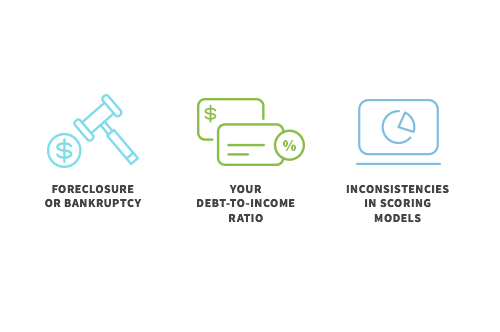If you are like many credit-conscious individuals, you have spent time improving your credit score. You have worked hard to make your payments and avoid anything that can negatively impact your credit score. Then you may have been surprised to be rejected for a loan or a credit card. Or, if you haven’t been denied yet, you might be concerned about getting a denied credit card credit score in the future.
Estimates put the percentage of people with a FICO credit score above 800 at about 20%. But these individuals are not guaranteed credit approval. The fact of the matter is that credit score is not the only factor that can affect approval. Even people with excellent credit scores can be denied. Learn what else you need to keep in mind if you have a good credit score and plan to apply for some kind of credit.
Short Credit History
Length of credit history plays a large role in determining risk as well. This is a frustrating reality for many people. No matter how high your credit score is, many banks or businesses may not want to approve someone with a short credit history.
If this is true for you, what can you do about it? By the very nature of this problem, the only solution is to wait. Over time, the problem will slowly go away. In the meantime, make sure to continue making your payments on time to keep your credit score high. Typically, a good credit history length is at least a few years. You can ask whichever bank you hope to apply with what they consider a good length.
Debt-to-Income Ratio

Another thing to be aware of is your debt-to-income ratio. Essentially, this is the amount of debt you owe compared to the amount of money you earn. Your credit score doesn’t play any role in determining your debt-to-income ratio. This is why people with good credit can still suffer from a bad debt-to-income ratio and be denied as a result.
To find your exact debt-to-income ratio, simply divide your total monthly debt payments by your total monthly gross income. Remember that gross income counts everything, including that which is withheld for taxes. For example, if you earn $7,500 in a month and all your debt payments that month add up to $3,000, then your debt-to-income ratio is 40%. Another way to think about it is that you would spend 40% of your income repaying debts each month in this scenario. Remember that a lower percentage is better. There are also free debt-to-income ratio calculators online that can help you.
What is considered a “good” debt-to-income ratio depends on what you are applying for and the particular standards of the organization. When applying for a mortgage, you usually need to have one below 43%. Some banks prefer something closer to 35%. Anything above 50% is seen as a red flag. It makes lenders nervous about your ability to pay off debt, especially if it is added on top of what you already have. If you figure out that your debt-to-income ratio is higher than you’d like, there are some things you can do to improve it.
- Pay off some credit cards or other loans to lower your monthly debt
- Increase your income by asking for a raise, switching jobs, or taking a second job
- Get a debt consolidation loan to repay your debt faster
Your debt-to-income ratio is a significant element that affects your ability to be approved for credit. You can’t afford to ignore it.
Negative Events in Your Past

There are a few other things that affect your ability to qualify for credit, such as bankruptcy or foreclosures in your past. These usually stay on your record for seven years. During this time, these hurt your credit score, but they impact your credit less over time. However, a few organizations still consider them when looking at credit applications, so even if a bankruptcy is five years old, and you’ve built up a good credit score, the lender still may not approve you. The further back these are in your past, the less they affect you, so one option is simply to wait. Alternatively, a credit repair company may be able to help you sooner.
The Scoring Model
Another possibility is that your credit score is not as good as you think it is. Many people forget that there are lots of credit scores and that each model is different. You may pull your credit score from one company but the bank you apply with uses a different credit scoring model. If this is the reason you are rejected, your best option may simply be to apply elsewhere. It can be frustrating when the organization you apply to for credit disagree with your perception of your own credit. Mckenzieadams.net can help you get your credit in shape so that you have a better chance of being approved for credit. Contact us today for a free credit evaluation.
Carry on the conversation on our social media platforms. Like and follow us on Facebook and leave us a tweet on Twitter.
***Call us NOW at (888) 810-2897 or visit mckenzieadams.net to learn how to Protect and Improve your credit RIGHT AWAY***

